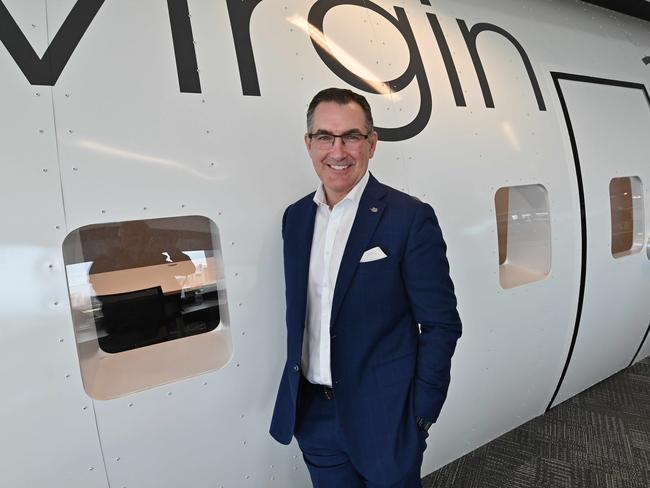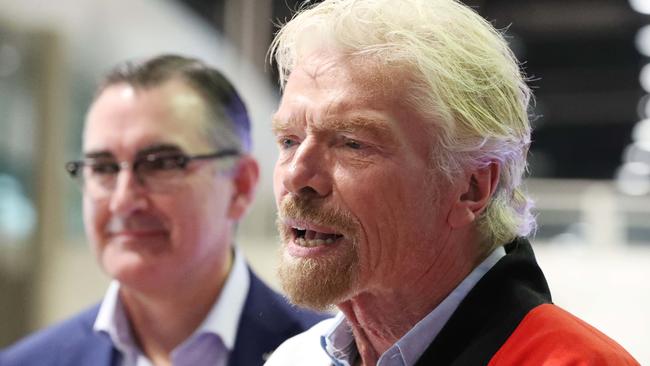Flights to Sydney ready to take off as Virgin CEO reveals toughest hour
Virgin Australia CEO Paul Scurrah has revealed how he made the bombshell decision to put the airline in administration and what British billionaire Richard Branson thought.

QLD Business
Don't miss out on the headlines from QLD Business. Followed categories will be added to My News.
Virgin Australia boss Paul Scurrah has lifted the lid on the most tumultuous time in the airline’s history as it again prepares to increase flights between Queensland and the nation’s most populous city.
Australia’s second-largest carrier has confirmed it is monitoring the government’s plan to open the border to New South Wales on November 1.
It is understood the airline is ready to resume flights between Sydney and Cairns, as well as increase the frequency of services from the Gold Coast, Sunshine Coast and Brisbane.
The slow resumption of flying for Virgin Australia comes following the most tumultuous time in the airline’s history.
State Government to sign $200m agreement with Bain Capital to keep Virgin headquarters in Queensland
Virgin Australia staff locked in enterprise talks
Up to 150 Virgin corporate and head office staff to be made redundant
In February, two decades after Ansett’s collapse and with COVID-19 sweeping across the globe, Virgin’s bills hit the billions of dollars and 90 per cent of its aircraft were grounded.
On the evening of April 20, 86 days after Australia’s first COVID-19 case was detected, Virgin became its first major corporate victim.
Now, Mr Scurrah has recalled the “bittersweet” moment his airline was saved from disaster and the key advice offered from British billionaire Sir Richard Branson.

The Virgin CEO, who previously ran Queensland Rail and is now on the board of the Gold Coast Suns, is no stranger to tough times – having worked as Ansett Australia’s sales general manager during its collapse in 2001.
In February Mr Scurrah and the Virgin board were begging governments, shareholders and investors for support – exhausting every avenue to boost the balance sheet as COVID ran a sledgehammer through the economy.
Virgin was told to find a market-led approach, with governments refusing to stump up their cash amid fears it would set a precedent.
“There was a lot of understanding and sympathy from the governments we were talking to and we understood completely their position and their decisions,” Mr Scurrah said.
“We just needed to know we exhausted all avenues.
“It was a tiring and exhausting period talking to every source of capital we could.”
Virgin was fighting on two fronts, with Qantas CEO Alan Joyce also lobbying hard against any support for his rival.
Mr Scurrah said, on reflection, “it was not the time to be beating up on each other”.
“How my competition conducted himself was a decision for him to make and others to judge,” he said.
On April 20, with its cash reserves of $1bn dwindling, Australia’s second-largest airline told the stock market it had collapsed into administration and control of the company handed to Deloitte.
“It wasn’t a difficult decision, but it was the most confronting decision I’ve ever had to face,” Mr Scurrah recalls.
“It was a very stressful environment to be in, we knew a whole heap of panic and worry would follow that announcement.
“It (administration) was something we were monitoring for weeks and weeks and (COVID-19) made it a very fast-moving, decision-making environment.”

Within 24 hours 10 parties had already expressed an interest in buying the carrier and nine days later the number of bidders had doubled.
Despite the level of interest, Mr Scurrah remained concerned about the carrier‘s fate.
“No one really could predict with any confidence what was going to happen,” he said.
Administration meant Virgin had to quickly ditch unprofitable parts of the business, including Tigerair, the Airbus A330 aircraft and some regional routes.
In a devastating blow, 3000 of its 9000 staff were sacked due to low demand through COVID and a changing business model.
During the sleepless nights, when there was a sense the situation was out of his control, Mr Scurrah turned to British billionaire and Virgin founder Sir Richard Branson for advice.
“He was keen to coach us through,” Mr Scurrah said.
“Sir Richard was keen to see people treated well, which is part of the Virgin Group’s mantra.
“He was keen to see us survive.”
On Friday, September 4, Bain Capital – the United States investment giant founded by presidential candidate Mitt Romney – was named new owner of Virgin after defeating a last-minute charge by bondholders.

Mr Scurrah didn’t pop the champagne but felt a slight sigh of relief that his airline wouldn’t join Ansett in the history books.
“It is bittersweet because the sweet part is we have a future and we can establish a business that employs people,” he said.
“The bitter part is asking wonderful people who have done nothing wrong to leave.”
On the Friday night after creditors endorsed Bain Capital’s takeover Mr Scurrah went to his car and found an anonymous note under the wiper blade.
It said: “Thanks for your amazing work. We couldn’t have got through 2020 without you.”
Bain Capital is slowly relaunching Virgin, with 56 Boeing 737 aircraft returning to the skies within weeks.
The new board’s focus will be on shifting Virgin from a strong airline into a strong business with 6000 workers – down from 10,000 pre-COVID – slowly returning to the skies as demand returns.
Five years from now, Mr Scurrah believes Virgin will again be a profitable airline carrying thousands of passengers to international destinations, including between Tokyo and Brisbane – the long-awaited route that was cut a week before launch.
He hopes a crisis like COVID-19 won’t hit the aviation industry again, but if it does, Virgin will be ready.
“Hope for the best and plan for the worst,” he said.

